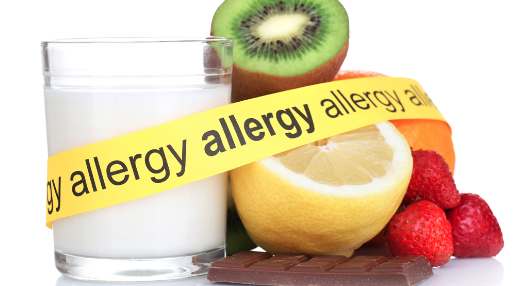Food allergies and intolerances are running rampant these days, more common than ever before.
Just take a walk through most any grocery store, and you’ll see whole aisles dedicated to allergen-free, gluten-free, and dairy-free foods. Schools and camps have nut-free zones. And even chain restaurants offer special allergy-safe menus.
While those accommodations make it easier to live with food allergies and intolerances, they don’t really address the real issue. And since there aren’t really any conventional medical treatments, people struggling with these issues are stuck avoiding (or at least trying to avoid) their food triggers.
A new line of research may just change all of that. It turns out that strategic changes to your microbiome (the trillions of bacteria in your gut) can help increase food tolerance and maybe even reverse food allergies. And the best way to do that is with Just Thrive Probiotic and Antioxidant supplement.
Immune Responses to Food
Food allergies happen when your immune system overreacts, treating food like an infectious threat. Here’s how it works: Your body produces proteins called immunoglobulins (Ig) when it feels threatened. Those proteins work as antibodies, and go on the attack. But since there is not actual threat – just food – those antibodies set off an inflammatory response that causes allergy symptoms.
The most severe cases involve IgE antibodies, which can trigger immediate life-threatening responses like anaphylaxis.
When other types of antibodies are released – called non-IgE responses – different immune responses occur. That usually causes GI symptoms that show up a few days after the offending food was eaten.
When your body has a reaction to food without an immune response, that falls into the food intolerance category (sometimes called food sensitivity). The most common intolerances include gluten, dairy, FODMAPs (a group of carbohydrates found in normally healthy foods like apples, onions, and chickpeas), and histamine. These are set off by digestive system reactions, and can cause some very uncomfortable consequences like gas, bloating, and abdominal pain.
Any one of these reactions can impair your quality of life… making it harder to go to restaurants and celebrations, or even just to grab a burger and a beer with your BFF.
But getting to the root cause of these unwanted reactions may reduce that oversensitivity and help your system tolerate even the trickiest foods. And all it takes is a microbiome reconditioning and rebuild, helped along by Just Thrive.
CLICK HERE TO PURCHASE JUST THRIVE PROBIOTIC
Bacteria Imbalance Brings Intolerance
The specific bacteria species in your microbiome has a huge effect on your immune response – including how your system reacts to food. Research shows that composition of gut bacteria in people without food issues looks very different compared to people with food allergies and intolerances.
Two key things that people with allergies and intolerances have in common with each other: a lack of diversity among bacteria strains (meaning not enough different kinds) and an imbalance between bad and good bacteria (where there aren’t enough good bacteria to keep the bad in check).
A lot of things that can throw your microbiome out of balance, including
- Antibiotic use
- Processed foods
- Glyphosate (check out these articles about the dangers of glyphosate)
- GMO foods (learn more about those here)
- Chronic stress
When that happens, it can increase food intolerances and impair proper immune response, along with causing gastrointestinal (GI) distress.
In addition, specific bacteria have been linked with food intolerances.
For example, too many histamine-producing bacteria (which include strains commonly found in yogurt, like Lactobacillus casei) can lead to histamine intolerance that kicks in when you eat foods like avocados, spinach, and shellfish, causing systemic symptoms from headaches to nasal congestion to nausea. And a lack of bacteria such as Bacillus subtilis can make it harder for your digestive system to break down gluten proteins, leading to the very uncomfortable symptoms of gluten intolerance.
But supplying your gut with fresh beneficial bacteria – especially spore-form probiotics that support microbiome diversity – may help reduce food intolerance, ease discomfort brought on by non-IgE responses, and support a more balanced IgE response.
Probiotics Build Tolerance for Trigger Foods
Exciting research into probiotics and food intolerances are helping people around the world get back to their favorite meals. Scientists have uncovered several ways that probiotics help moderate immune response to foods and alleviate the digestive issues that can cause sensitivities.
- Probiotics stimulate healthy interaction between natural gut bacteria and the immune system, helping improve food tolerance
- Probiotics help calm IgE production by increasing IgA (an intestinal immunoglobulin that helps boost tolerance)
- Probiotics strengthen the intestinal barrier to prevent “leaky gut” issues
- Probiotics secrete enzymes such as lipase and protease which are use in food digestion
- Probiotics can reduce intestinal inflammation, which can increase food sensitivity
The four spore-form probiotics in Just Thrive Probiotic can accomplish all of that and more. Because these potent probiotics survive digestion to arrive and thrive in your intestinal tract, they’re able to restore healthy balance to your microbiome. That helps improve immune and intestinal function, which reduces overreactivity and food sensitivity.
Try Just Thrive today to start rebuilding tolerance for your favorite trigger foods.









